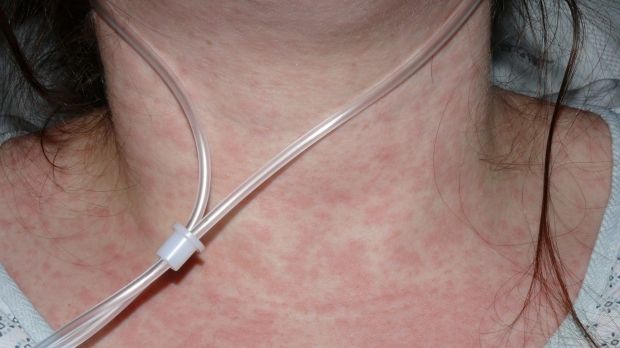
Measles displays in blotchy red patches.
Brisbane’s southside is on alert for measles after doctors diagnosed the second case in two weeks.
There were only six cases diagnosed in the Metro South Health (MSH) area last year but the district’s public health physician, Dr Kari Jarvinen, said the second diagnosis this year wasn’t “unduly surprising”.
The measles sufferer visited Bunnings Warehouse in Mt Gravatt during the traditionally busy Saturday afternoon period on January 3, while infectious.
Dr Jarvinen said customers of the store needed to be on alert for symptoms of the highly infectious disease.
Anyone who visited the hardware between 2.30pm and 5.30pm should contact their GP if unsure of their measles immunity.
Dr Jarvinen said given the large numbers of people potentially exposed more measles cases were possible in Brisbane or elsewhere over the next few weeks.
“What we are advising proactively is, if you’re not sure if you’re immune or whether your child is immune, go to your doctor, get them to check and vaccinate if need be,” he said.
“Let the surgery or emergency department know beforehand you might have measles so you don’t spread it to more people.”
Measles is one of the most infectious communicable diseases and is spread by tiny droplets through coughing and sneezing but can be all-but prevented with two doses of the Measles Mumps Rubella vaccine.
True measles is a serious viral infection that causes fever, cough, runny nose, then a red spotty rash and sore eyes a few days later.
“Measles can be a serious disease so there are around 30% of fit, healthy adults who get measles will need to be hospitalised,” Dr Jarvinen said.
“Queensland Health staff will continue to actively investigate this case and do whatever they can to prevent further transmission.
“Because of recent measles outbreaks overseas, it is particularly important for travellers to get vaccinated before leaving Australia.”
The two cases came from “very different” sources and weren’t believed to be related, Dr Jarvinen said.
Measles can be infectious for about five days before the onset of the rash, and symptoms usually start about seven to 10 days after infection, but sometimes slightly longer.
There were 27 measles cases in the Metro North Health area last year but none to date recorded in 2015.
